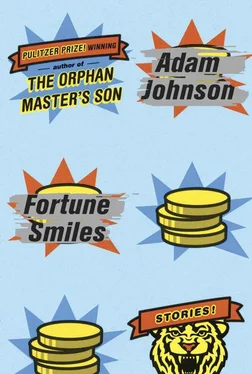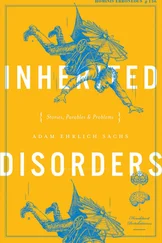—
That night I wake from a dimly lit dream to discover Prinz standing on my chest. He does not bark, but the little dog is so rigid, his coat bristles. I follow his gaze from the couch to the curtains in time to see a shadow stir outside. The Polaroid flashes, and I rise.
On the lawn, I discover my daughter, clad in a heavy coat. “Nina?” I ask.
She looks toward me, startled. Something is in her hands.
“Nina, what’s the meaning of this?” I ask.
“I’m sorry, Papa,” she says, and sets a small package on the lawn. “We keep discovering these artifacts. Mama can’t have them around.”
“Your mother — is this where they’re coming from?”
Nina says, “She says she will contact you when she reaches Step Nine.”
“Step Nine?” I ask. “What does this mean, Step Nine ? What step is she on now?”
My daughter glances toward the street, where a car is waiting. There is a figure inside.
“Is that your mother?” I ask. “Is that her in the car?”
My daughter takes a step backward. “Papa, I wish it weren’t this way,” she says. “She will write you a letter soon, when she’s ready. For now, she’s healing.”
I step toward her. “Healing from what?” I ask. “Is this about the war? Or how those damned nuns treated her?”
She begins moving away. “I’m sorry, Papa,” she says. “I must go.”
I race to cut her off. “Is it her photographer friend? Does he put her up to this?”
She shakes her head, tries to move around me. But I don’t let her.
“Do they talk their stupid sober talk together?” I demand. “Or did he dump her, is that what she’s healing from?”
My daughter tries not to listen, but I know I’m onto something.
“The photographer was cruel to her, wasn’t he? He left her, and now she has no one. Now she’s completely alone, isn’t she?”
“There’s no photographer,” my daughter says. “It’s you. You’re the one she recovers from.”
“Me?”
“Don’t you remember?” she asks. “Don’t you recall anything?”
“The past, those days when we were a family — that’s all I think about.”
“What about the dairy wagons?” she asks. “Do you think about that?”
“What?”
Nina points toward the street where my wife idles. “I grew up with milk wagons driving down our street,” she says. “No one told me there was no milk, that they were really dressed-up prison vans delivering new inmates. Protesters, students, teenagers. People soon to be stripped and violated, their possessions confiscated.”
“But that wasn’t us,” I say. “I’m talking about family. You’re talking about work. These were duties I had to perform.”
“You gave me gloves!” This she practically spits at me. “I wore them everywhere, showing them off, their softness, their perfect fit! How could I know where they’d come from? Why would no one tell me they’d been taken from a girl just like me, a girl who went into that house of crimes?”
She turns and hurries away.
My daughter, practically running from me. My wife, driving the getaway car.
—
At the dining table, I stare at the Polaroid of my daughter bending to place the package on the lawn. Her gaze is cast warily toward the house where I’m fast asleep. Her own house, the house where she grew up.
“It was no house of crimes,” I tell Prinz.
Then I lift the package. My little dog is filled with nervous energy. He stands on his stool, looking from me to the package and back, his eyes wet, tongue flashing in and out.
A prison is not a pretty place, this we know. Perhaps it would be easier on a wife and daughter if a man were a farmer or a folksinger. But someone must run the facilities, someone must undertake the unpleasant tasks. It’s not like, with a father who’d been imprisoned by the Soviets, I could advance in the Party. It’s not like, with a mother who’d nursed Germans and GIs alike, I was welcome at any universities, which I’d dreamed of attending. And Nina forgets that she went to the best schools because of my service.
I snip the twine, tear away the brown paper.
Inside the box is a pair of calfskin gloves. There is no story behind them — I simply discovered them in the “lost and found” box and thought they’d fit my daughter.
Also in the box is a pen. This object I remember well. This the curator would deeply desire. It was found in the possession of a dissident writer. You can probably guess her name, as she had been in a relationship with another famous dissident writer, a Russian, and this was the pen he had made in prison and, upon his freedom, given to her. The pen is heavy and pointed and fashioned from pot metal. The Russian prisoners were allowed the use of pens, and these they created for self-defense, the irony being that this one was used for novels.
I brought the pen home, and when Nina saw it, she loved it, so I made it hers. She wrote all her school papers with it. Tell me, if there was something wrong with the pen — how was it that Nina received such high marks? If I was so terrible, how was it that Nina excelled in singing and dancing and scholastics, how did she star in three consecutive school plays?
“I wasn’t such a bad father,” I tell Prinz. “I was no horrible man.”
I set aside the gloves and pen and ashtray and bracelet. It’s the keys to the prison I take in my hand. Prinz sniffs them once. “I’m not a criminal,” I tell him. I flip through the keys, one by one, pausing to conjure in my memory the image of each door they open.
—
I decide to make the video but to do it my way. It takes an entire day to prepare. To modify my appearance, I buy a new vest and a fashionable shirt, both very modern. Next I purchase a toupee, and I am surprised at how natural it looks. To top this off, I invest in a sporty cap. At an electronics shop, I am shown eyeglasses with a miniature camera mounted in the frames. It can record hours of footage, everything I look at, and is nearly invisible.
The next morning, across from 66 Genslerstrasse, Prinz and I watch as the school buses arrive. Eventually, we spot a smaller bus, older, a bus from the countryside. One by one, Ossi high school students emerge. They all wear similar jackets, as if they are in some sort of Blaskapelle group.
Prinz and I approach. We find the driver sitting on a memorial planter, smoking.
“Visiting from Gera?” I ask.
“Zwickau,” the driver says.
“How long do these tours take?” I ask.
“Fifty-five minutes,” he says.
Despite looking generally worn-down by life, he is clean-shaven and wears a wedding ring.
“I need someone to watch my dog for fifty-five minutes,” I say, and show him a twenty-euro note. “You must wait regardless, yes?”
He looks at the dog and nods. He takes the money.
“There’s only one duty,” I say, removing a bag of goldfish from my pocket. “The dog must receive one of these treats every three minutes.”
The driver takes the orange treats and shakes his head. “Berlin” is all he says.
I kneel down to Prinz. “I must make this journey alone,” I tell him.
His eyes flick back and forth, looking into mine. I know what he means to say.
I purchase a ticket and wait in the maintenance yard with a dozen teens from Zwickau, the children of auto factory workers. Across their matching maroon jackets are embroidered music notes of gold. A guide approaches, a man in his forties. His hair stabs in different directions from some type of styling, and he looks mildly hungover. What a libertine life — a fat salary for giving an occasional tour to high school kids. I bet he spends his days smoking hemp and listening to Volksmusik. But he veers toward a group of Wessi kids who I can tell at a distance are from Frankfurt — loud and entitled banker-babies with test scores that have already gotten them into colleges in California.
Читать дальше












